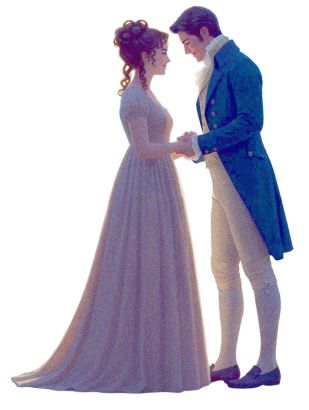NPC ANNOUNCES AUDITIONS FOR...
The Classic Story of Friendship, Flirtation and Romance!
This show is Adapted from the novel and Directed by Katherine Stewart.
Call for Auditions!
Tuesday, January 13, 2026 • 7:00 PM - 10:00 PM MST
NPC's Snowflake Campus - Performing Arts Center
1611 S. Main St. • Snowflake, AZ 85937
What to Prepare:
PLEASE HAVE MEMORIZED:
One classic monologue no longer than 1.5 minutes in length
- Classical monologue written Pre-1900 demonstrating skill with heightened text and understanding of the language and older speech patterns.
- Should be appropriate in age and similar in type to the character for which you most want to be considered.
- Should be similar in style and language to the story of Emma ( A classic romantic comedy with dramatic moments), but NOT FROM EMMA.
- PLUS -
One of the following monologues, to be delivered in an RP dialect (Received Pronunciation – Standard British):
Lady’s Monologue:
I have none of the usual inducements of women to marry. Were I to fall
in love, indeed, it would be a different thing! but I never have been
in love; it is not my way, or my nature; and I do not think I ever
shall. And, without love, I am sure I should be a fool to change such a
situation as mine. Fortune I do not want; employment I do not want;
consequence I do not want: I believe few married women are half as much
mistress of their husband’s house as I am of Hartfield; and never,
never could I expect to be so truly beloved and important; so always
first and always right in any man’s eyes as I am in my father’s.
Gentleman’s Monologue:
Depend upon it, Elton will not do. Elton is a very good sort of man,
and a very respectable vicar of Highbury, but not at all likely to make
an imprudent match. He knows the value of a good income as well as any
body. Elton may talk sentimentally, but he will act rationally. He is
as well acquainted with his own claims, as you can be with Harriet’s.
He knows that he is a very handsome young man, and a great favourite
wherever he goes; and from his general way of talking in unreserved
moments, when there are only men present, I am convinced that he does
not mean to throw himself away. I have heard him speak with great
animation of a large family of young ladies that his sisters are
intimate with, who have all twenty thousand pounds apiece.
View Character Breakdown:
Miss Emma Woodhouse (female, 20-30) – “handsome, clever, and rich.” Everyone’s favorite person and well aware of it. Mistress of Hartfield, the family home, and queen of the village of Highbury. Easily bored. Enjoys “helping” others, whether or not they need it. Her flaw is that she is just a little too certain of everything. If she grows up a bit, however, she’ll be an amazing woman.
Mr. George Knightley (male, 25-40) – also handsome, clever, and rich, though far more pragmatic and down-to-earth. Excellent friend to the Woodhouse family and the village at large. Responsible, friendly, honorable, and good-humored. The only one in the world who tells Emma the unvarnished truth. Probably in love, though you’d never know it.
Mr. Henry Woodhouse (male, 55+) – Emma’s father. A complete hypochondriac that needs constant attention and validation. Affectionate, almost to the point of smothering. Lonely if the room isn’t filled with people, and he loves the whole community.
Mrs. Anne Weston, formerly Miss Anne Taylor (female, 35+) – former governess to Emma and her best friend and advisor. A grounding presence and source of counsel, her departure after her marriage to Mister Weston leaves a void in the Woodhouse home. Wise and patient.
Mr. Weston (male, 40+) – widower that marries Miss Taylor after a four-year courtship. Patient, caring and hopeful. Determined to be cheerful and optimistic. Longs to be reunited with his now-grown son, Frank Churchill.
Mr. Philip Elton (male, 25-35) – village vicar with ambitions to socially climb. Charming to all and clever enough to know of his attractive qualities. Knows how to flirt respectfully, though his self-assurance could be a stumbling block.
Miss Hetty Bates (female, 30-45) – never married and poor, though beloved by the entire community. Very, VERY chatty and enthusiastic about literally everything. Probably the most loyal and forgiving person in the village. Too good for this world.
Mrs. Bates (female, 60+) – Miss Bates’ mother, who has seen enough of life to ignore the rest of it. More interested in tatting than tittle-tattle. Knows everything, but likely too tired to care.
Harriet Smith (female, 18-25) – a young orphan woman of dubious background, though virtuous and pure of heart. Earnestly wants to live up to people’s expectations, because validation equals love. And she has her own love to give. And give. And give. Becomes Emma’s pet project.
Robert Martin (male, 20-30) – young and promising farmer that works for and with Mister Knightley. Smitten with Harriet Smith, and would like nothing more than to marry her. Upright, kind, and hard-working.
Isabella Knightley, formerly Woodhouse (female, 25-40) – Emma’s older sister, though not nearly as clever. Married to John, Mister Knightley’s younger brother. Only interested in domesticity, with five high-spirited children. Always defers to her husband. In everything.
John Knightley (male, 25-35) – Mister George Knightley’s younger brother, married to Emma’s older sister, Isabella. A bit bullish and bluff; perhaps he escalates a situation rather than calms the coming storm. Not known for tact.
Jane Fairfax (female, 20-35) – perfection, which annoys Emma to no end. Sings beautifully, plays impeccably, possesses lovely manners and classic beauty. The only imperfection would be the heartbreaking secret she cannot reveal. Of course, that adds to her mysterious allure, and that annoys Emma even more.
Frank Churchill (male, 25-35) – a rock star before he even comes to town. Sent away from the village as a child to live with wealthier relatives, he returns to reunite with his father, Mister Weston. An incredible flirt, devastatingly attractive, and slightly irresponsible. His reckless immaturity is charming in the beginning, but it can’t really last.
Mrs. Goddard (female, 40+) – respectable lady who runs a private boarding school for young ladies. Warm and intelligent, she initially takes Harriet Smith under her wing until Emma decides to take on the orphan as a social project. Observant and easygoing, with a good eye for character.
Mr. Perry (male, any age) – village apothecary and a thorough quack. Constantly plying Mister Woodhouse with tinctures, elixirs, gruels, and medicines. He sweeps in for a moment and leaves behind bottles and packets of mysterious substances. Puts on airs of being a doctor, since none reside in the neighborhood.
Mrs. Elton, formerly Miss Augusta Hawkins (female, 25-40) – nouveau riche, loud, and very important, didn’t you know. Confuses money with breeding and class, and steps on those too genteel to slap her down. Marries Mister Elton since she has the fortune and he has the respectability. Aims to outdo Emma in “helping” everyone.
* Auditions are open to ANYONE!
PLAN AHEAD - CALLBACKS WILL BE JANUARY 15, 2026, AT 6:30 PM. WE WILL LET YOU KNOW IF YOU'RE INVITED TO A CALLBACK.
Remember: no one behind the table is paying for your performance. You are giving them a gift. Enjoy the chance to perform for them. They are on your team! They want you to make their job easy. They are rooting for you to be THE ONE. Enjoy the opportunity to show them your best.
Give it all you've got!
Questions Please contact Richard 'Carson' Saline | email | (928) 536-6247







